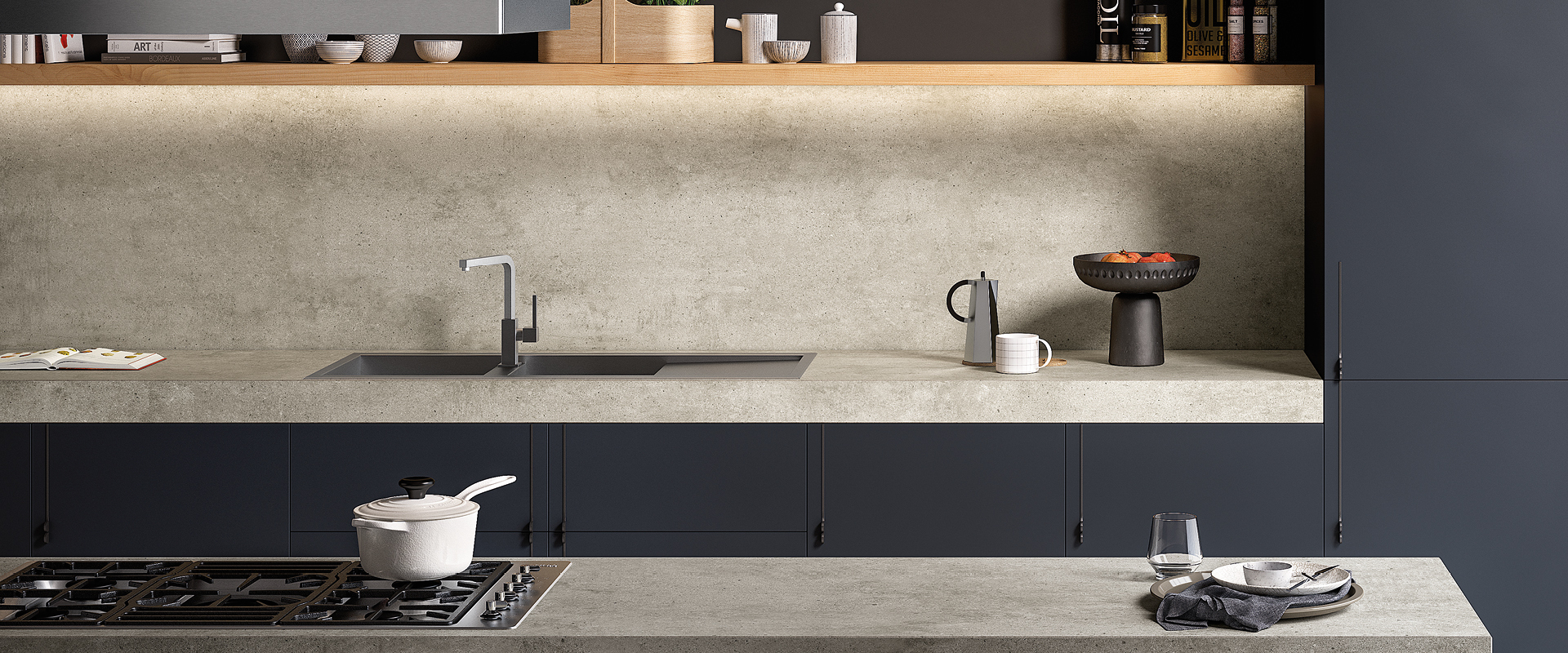
When it comes to interior design projects, kitchen worktops give rooms a distinctive look and are an eye-catching feature that enhances the overall look of the room.
In terms of functionality, they are a key element that is designed to make it easier to carry out everyday activities.
Kitchen worktops are a reflection of the style of the home and should complement the furnishings.
Carefully choosing the right material for your worktop is essential to creating an enjoyable everyday experience and a sustainable, eco-friendly home.
There are several different kitchen worktop materials on the market:
Each of these options has its own specific characteristics.
In this article we will look at different types of kitchen worktops to help you decide which is the best choice for you based on specific aspects such as resistance and durability, aesthetics, sustainability, practicality, and ease of cleaning and maintenance.
Valued for its precious look and ability to withstand high temperatures, granite is a porous material that requires regular maintenance to keep its surface intact and avoid stains.
It is a natural material that is quarried, which results in changes to the local landscape and causes natural habitats to disappear.
Granite is a heavy material that requires support structures during the installation process and special attention must be paid to ensure long-term safety.
With its unique and sophisticated beauty, marble has always been the preferred material for luxury interior design projects.
Although marble is known for its refined, glossy and veined appearance, it has a number of drawbacks that make it difficult to use.
In fact, it requires proper care and maintenance as it is prone to scratches and stains.
Although it is resistant to heat, it is less resistant to acids and abrasive substances, which can damage the surface.
As with granite, marble quarrying has a significant environmental impact, with the potential to damage the ecosystem and consume large amounts of water and energy resources.
Quartz is an engineered material that is made from a mixture of natural quartz, resins and pigments.
Pigments add different colours and finishes to the material which, together with synthetic resins, can have an impact on the sustainability of the worktop.
Although practical and easy to maintain, this material has limited heat resistance and can be damaged by exposure to high temperatures and thermal shock.
Wooden kitchen worktops are a popular choice because of their warm, natural look. However, they are susceptible to scratching and staining, and therefore require a certain amount of care to maintain their appearance.
The need for regular maintenance to prevent damage from moisture is another reason why they are not very practical.
The environmental impact of wood is influenced by two key factors: forest management practices, which can contribute to deforestation, and production practices, which require the use of harmful chemicals.
Laminate kitchen worktops are made up of several layers of paper that have been impregnated with a resin and then coated with a thin layer of decorative material.
It is inexpensive, but at the same time not very durable, and its production has a significant environmental impact due to the use of chemicals.
Laminate is not as suitable for intensive use as other materials due to its poor resistance to impact, heat and moisture.
Daily maintenance is essential to maintain the appearance and functionality of laminate worktops.
When compared to other natural materials such as wood or natural stone, laminate has a shorter life cycle and does not decompose as easily.
Porcelain stoneware is made from a mixture of natural raw materials such as clays and feldspars. It is a compact, fully recyclable and nonporous material.
Porcelain stoneware worktops combine an extremely versatile look with excellent resistance to impact, stains and heat.
They are available in a wide range of colours and aesthetic finishes that accurately replicate the look of natural rocks such as marble, granite and stone, as well as wood and concrete.
Ceramic surfaces have antibacterial properties and are easy to maintain.
Due to its strength, durability and aesthetic appeal, porcelain stoneware is the material of choice for kitchen worktops compared to other available materials.
The wide range of texture effects available gives you unparalleled freedom of design and endless possibilities for customisation.
In addition, due to its composition, advanced manufacturing processes and durability, porcelain stoneware is the most environmentally-friendly material with the lowest environmental impact.
SapienStone is an Italian brand of the Iris Ceramica Group that specialises in the production of porcelain stoneware surfaces designed to express a contemporary and cosmopolitan lifestyle.
Style, design and functionality are combined in a full-body material with realistic textures, which overcome the limitations of natural materials such as marble, wood and granite.
Aesthetic potential and design flexibility are further enhanced by 4D Ceramics technology, the availability in large formats (160 x 320 cm) and tactile finishes.
Need to choose a kitchen worktop material for your next design project?
Please feel free to contact us for advice from our experts.